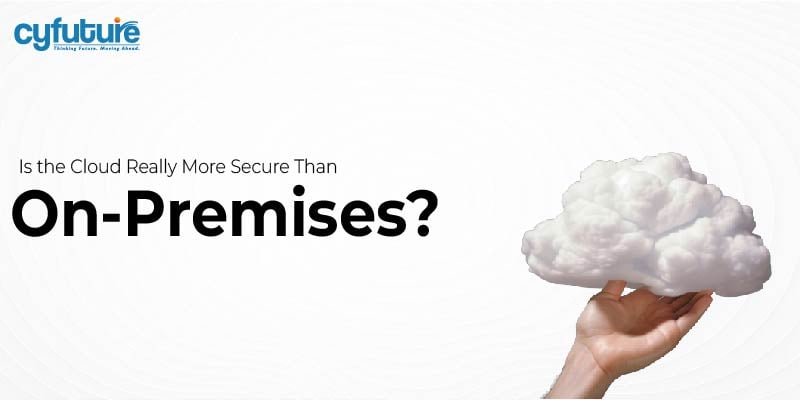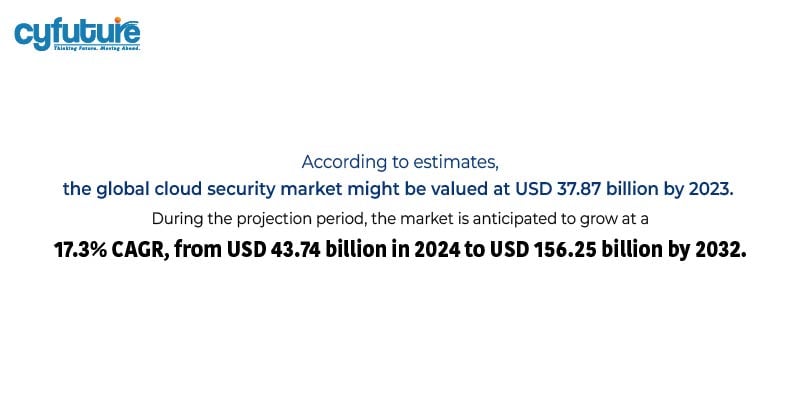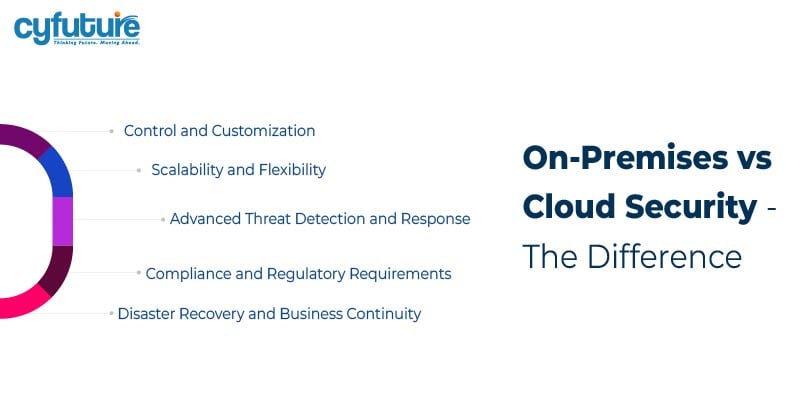-
Get Cloud GPU Server - Register Now!
Toggle navigation

“To cloud or not to cloud?”, It is a very modern question that booms out across boardrooms and IT departments across the globe. However, the debate is no longer on the merits of cloud computing but rather on comparative security with traditional on-premise solutions.
In fact, we live in a time when data breaches and cyber threats happen almost day in and day out; thus, making security of your data infrastructure has become paramount. Furthermore, while having certain security aspects managed by the cloud provider is nice, it’s hardly comprehensive. The cloud presents its own set of data security concerns that need to be addressed.
In this comprehensive blog post, we will dive deep into the details of cloud security services compared to on-premises security to debunk this concept once and for all: the cloud is more secure.
However, let’s take a look into a few stats and data before delving deep.

Now, let’s delve into the deep knowledge pool!
The digital landscape has indeed undergone a sea change in the last decade. As more businesses migrate to the cloud, the fears about security have also evolved. Conventionally, on-premises security was considered the gold standard.
Nothing beats having control over data and systems directly. However, the increasing levels of sophisticated cyber-attacks have shown that even the most robust on-premises systems can only do so much to mitigate such situations.
Although cloud computing was previously misapprehended concerning security issues, it has indeed caught up. Today, Cloud Security Services provided by top-tier Cloud Security Providers are invested with advanced technologies and methodologies that often edge out traditional on-premises systems.
These managed cloud security services help in having an inclusive approach toward security for data, applications, and networks, hence ensuring strong cloud data security services suit the dynamic needs of modern enterprises.
Cloud security is conceptualized to be multi-layered in nature for the protection of data at each level of its lifecycle, whether stored in transmission or during processing. To that effect, we present the most vital components that make cloud security strong as a defense mechanism.
Encryption forms the backbone of security for cloud data services. Cloud providers make use of secure encryption protocols that ensure the protection of data while at rest or in transit. Advanced encryption standards and transport layer security protect data against unauthorized users even when intercepted.
IAM is about ensuring that unauthorized persons will not have access to sensitive data. IAM controls provided by the cloud providers are very advanced and can enable any organization to define and implement fine-grained access policies. MFA and SSO are widely used for additional security and to make users’ lives easier.
IDPS are part of cloud computing security services. These systems majorly monitor network traffic for signs of probably malicious activity and take preliminary actions to stop the attacks. Using machine learning algorithms, IDPS can identify and respond to threats faster and more accurately.
Continuous monitoring and logging are necessary to maintain security in cloud environments. The monitoring tools provided by various cloud providers track system activity and generate real-time alerts if any suspicious behavior is tapped into the system. Logging mechanisms enable the recording of detailed audit trails that a business can use for forensic analysis if needed, and for adhering to regulatory requirements.
Managed cloud security services refer to an end-to-end security solution wherein threat detection, incident response, and compliance management are provided. Outsourcing security to a managed service provider allows companies to ensure expert oversight and 24/7 monitoring of their security without having an in-house security team.

On-premises security offers control and customization that is unparalleled by others. An organization can tailor security measures to suit particular needs, set in place stringent controls on access, and exercise physical oversight over the infrastructure. Such a level of control would be most welcomed for industries with very strict compliance requirements and sensitive data handling protocols.
This control indeed comes with high responsibilities and costs: Organizations must refresh their security setups against upcoming perils; these require huge hardware, software, and human investments. This can easily be overwhelming for those small-scale businesses that have fewer resources at their disposal.
In turn, cloud security depends on the experience and resources of Cloud Security Providers that provide state-of-the-art security with Cloud Computing Security Services. Their security keeps updating through higher encryption, intrusion detection systems, and artificial intelligence-driven threat detection.
The security management workload can thus be shifted to the experts while the organization remains free to concentrate on its core operations with the added advantages of contemporary state-of-the-art security technologies.
Scalability is one of the major advantages of security in the cloud. With Managed Cloud Security Services, an organization can grow its security posture with business growth, either scaling into new markets or surging in volumes of data.
The greatest thing about cloud security is that it easily expands and contracts with fluctuating requirements. It’s flexibility like this that pretty much saves businesses with rapidly growing operations or businesses with fluctuating demands for products and services.
On-premise security usually does poorly on matters of scalability because this normally involves heavy capital investment in expanding an on-premise security infrastructure, coupled with heavy logistical planning. The rigid nature of the systems set up on-premise can reduce agility, in the sense that rapid responses are just about not possible to handle the emerging needs for security.
Cloud Security Providers utilize advanced mechanisms in threat detection and response that may be beyond the capability of traditional on-premise systems. Applying artificial intelligence and machine learning, cloud security platforms can spot and neutralize threats as they happen in real-time. These systems continually analyze large volumes of data for anomalies to ensure proactive defense against a cyber-attack.
In contrast, on-premise traditional systems typically depend on perimeter security using firewalls and antivirus software. Although these measures are still effective, they may fall short of dealing with complex APTs and zero-day vulnerabilities.
Since threat detection and response in on-premise systems are primarily manual processes, it results in delayed responses because of manual handling, hence raising the probability of data breach incidents.
Compliance with the regulatory requirements, maybe considered the most important feature of security, due to highly regulated industries in health care, finances, and government. This is a single instance whereby on-premises security gives an organization total control over ensuring that all compliance measures are attached to their respective industrial regulations.
However, the complexity and cost involved in maintaining compliance tend to be heavy. Cloud Security Providers offer specialized Cloud Data Security Services that make compliance management less complex.
These services include automated compliance monitoring, regular audits, and adherence to international security standards like ISO 27001 and GDPR. By the knowledge and experience of the cloud providers themselves, organizations can ensure compliance without increasing administrative overhead.
Disaster recovery also serves as a keystone to any security strategy. Planning for disaster recovery, and the implementation of those resources in on-premise systems is broad and complex: maintaining redundant infrastructure, performing regular data backups, and developing comprehensive recovery plans.
Cloud security is great for disaster recovery and business continuity. With automated backup and restore solutions, managed Cloud Security Services ensure data integrity and availability in case of a disaster.
The cloud service providers run geographically dispersed data centers that minimize even further the chances of data loss caused by localized events. This is where resiliency becomes a big positive factor in helping organizations recover fast and maintain continuity.
Regardless of the advantages brought about by cloud security, there are still concerns about data privacy, control, and reliability of the vendors. Let’s look into some of the common concerns and how they are mitigated by modern solutions for cloud security.
Data privacy is a major concern for any organization that looks to migrate to the cloud. Off-premise storage of sensitive data raises questions such as unauthorized access and data breaches.
The advanced encryption techniques used by Cloud Security Providers protect the data both in transit and at rest. In other words, end-to-end encryption means keeping the data confidential, and available to a selected few people of authority.
Besides, there are sophisticated access controls and robust identity management systems in cloud service providers that ensure sensitive data can be accessed only by the person who has been authorized for the same. Multifactor authentication and role-based access control further make the operations secure because unauthorized access becomes the least likely possibility.
One of the main reasons is a loss of control over data. However, contemporary cloud protection systems offer complete visibility and control over data and applications. The security platforms in the cloud create detailed audit logs, monitor situations in real-time, and give customizable security policies.
Thus, an organization may establish its security settings concerning its needs and demands, hence keeping control over its data but enjoying the scalability and agility provided by the cloud.
This would involve considering the reliability and inherent trust of cloud providers. A good Cloud Security Provider pursues several security assessments and certifications, showing due diligence in maintaining high-security standards. SLAs ensure that data availability, uptime, and incident response times are effective.
In addition, most cloud providers have better transparency of their security practices, enabling organizations to perform due diligence in finding the right provider. This transparency fosters greater trust and more significant confidence in the security measures of the cloud security service provider.
Last but not least, the question of security in the cloud versus on-premises is increasingly nuanced and complex. While the on-premises solutions uniquely offer unparalleled control and customization, they are very often weighed down by heavy costs and logistical challenges. On the flip side, security services powered by leading-edge encryption, advanced threat detection, and wide-reaching compliance frameworks offer a dynamic and scalable counterpart.
Continuous innovation by cloud providers in AI and machine learning further empowers them to detect and neutralize even the most sophisticated cyber threats in real-time. For an enterprise that lives in a time of unyielding cyber threats, the robust multilayered security architecture of the cloud is a formidable mechanism of defense, often out of reach for traditional systems on-premise.
Hence, any decision to migrate into the cloud must be underpinned by a strategic review of such advanced security paradigms to ensure protection for organizational data against the constantly changing digital world.
A Cloud Security Provider implements various layers of security measures, including encryption, firewalls, intrusion detection systems, and continuous monitoring. These cloud security providers typically use more advanced technologies and best practices in preventing breaches in data and any other kind of cyberattack.
Yes, for many organizations, the cloud is a lot more secure than on-premises solutions. Cloud Security Providers invest billions of dollars in security infrastructure and expertise; hence, they have very robust protection measures that, for many businesses, are ones they could never afford to achieve or maintain themselves.
Yes, every recognized Cloud Security Service Provider complies with a range of different regulatory standards such as GDPR, HIPAA, and PCI-DSS. They provide all the tools and documentation necessary to ensure that businesses fulfill their compliance requirements.
The cloud security services will implement overall incident response plans, consisting of real-time monitoring, event automation, and rapid containment strategies. Such providers minimize damages, notify the affected party, and avoid any future recurrence in the shortest time possible after a data breach.
Of course, Cloud Security Services allow small businesses to realize advanced security that may otherwise be unaffordable. This level of protection helps small businesses ward off cyber threats and maintain customer trust.